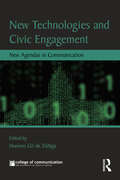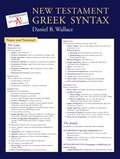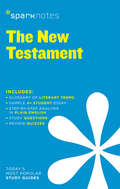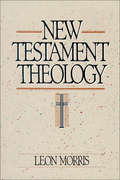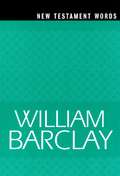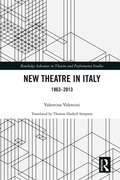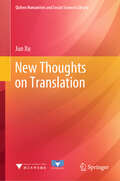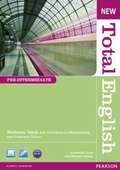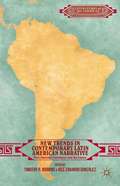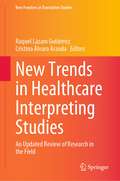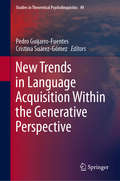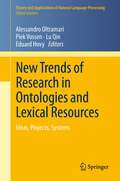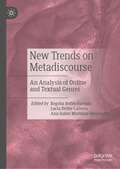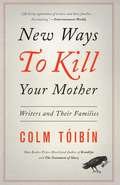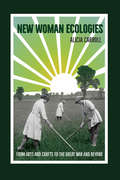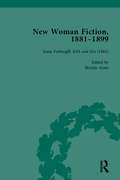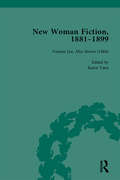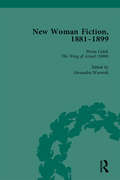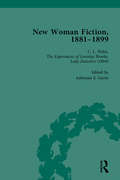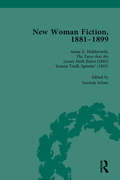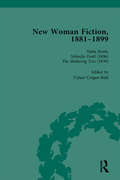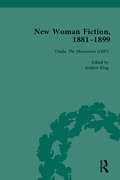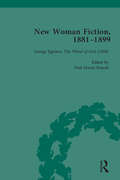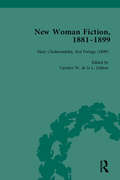- Table View
- List View
New Technologies and Civic Engagement: New Agendas in Communication (New Agendas in Communication Series)
by Homero Gil de Zuniga NavajasThis volume contributes to the extant and prolific New Agendas in Communication Series from one of the most salient perspectives within the field of Communication: New Technologies and Civic Engagement. The impact of the Internet and other technological advances are constantly referred to at most junctures of today's Communication research agendas. The area of Political Communication is not immune to this trend. The effects of the Internet and digital media on today's political landscape, with a particular emphasis on enhancing individuals’ civic duties and engagement levels, are theme of concern at many of the most renowned journals in Communication and Political Science disciplines. First, this book pays attention to the overall impact of the Internet and people's use of digital media and new technologies to analyze civic life at large, reconceptualizing what citizenship is today. Secondly, and more specifically, participants shed light over the intersection of a number of current new agendas of research in regards to some of the most rapidly growing technological advances (i.e., new publics and citizenship), and the emergence of sprouting structures of citizenship. The volume shows the implications that new technological advances carry with respect the possibilities, patterns and mechanisms for citizen communication, citizen deliberation, public sphere and civic engagement.
New Technologies for Literacy and Adult Education: A Global Perspective
by Daniel A. Wagner Robert B. KozmaThis book analyzes two interconnected approaches to using ICT (Information and Communications Technologies) to support adult literacy and adult/basic education.
New Testament Greek Syntax Laminated Sheet: Companion To Basics Of New Testament Syntax And Greek Grammar Beyond The Basics (Zondervan Get an A! Study Guides)
by Daniel B. WallaceThis summary laminated sheet of Greek Grammar beyond the Basics and Basics of New Testament Syntax is perfect for students to review categories of uses and look over possibilities when doing exegesis of the New Testament.
New Testament SparkNotes Literature Guide (SparkNotes Literature Guide Series #47)
by SparkNotesNew Testament SparkNotes Literature Guide Making the reading experience fun! When a paper is due, and dreaded exams loom, here's the lit-crit help students need to succeed! SparkNotes Literature Guides make studying smarter, better, and faster. They provide chapter-by-chapter analysis; explanations of key themes, motifs, and symbols; a review quiz; and essay topics. Lively and accessible, SparkNotes is perfect for late-night studying and paper writing. Includes:An A+ Essay—an actual literary essay written about the Spark-ed book—to show students how a paper should be written.16 pages devoted to writing a literary essay including: a glossary of literary termsStep-by-step tutoring on how to write a literary essayA feature on how not to plagiarize
New Testament Theology
by Leon MorrisThis work is not a history of New Testament times, nor an account of New Testament religion. Nor does it proceed from a view that the New Testament was written as theology. We must bear in mind that the writers of the New Testament books were not writing set theological pieces. They were concerned with the needs of the churches for which they wrote. Those churches already had the Old Testament, but these new writings became in time the most significant part of the Scriptures of the believing community. As such, they should be studied in their own right, and these questions should be asked: What do these writings mean? What is the theology they express or imply? What is of permanent validity in them? We read these writings across a barrier of many centuries and from a standpoint of a very different culture. We make every effort to allow for this, but we never succeed perfectly. In this book I am trying hard to find out what the New Testament authors meant, and this not as an academic exercise, but as the necessary prelude to our understanding of what their writings mean for us today. -- From the Introduction
New Testament Words
by William BarclayBarclay traces the meaning of New Testament words in classical Greek, in the Septuagint, in Hellenistic Greek, and in the papyri. This volume covers all the words originally explained in Barclay's A New Testament Wordbook and More New Testament Words, and it includes an index providing access, by both Greek and English, to every mention of these words in The Daily Study Bible.
New Theatre in Italy: 1963–2013 (Routledge Advances in Theatre & Performance Studies)
by Valentina ValentiniNew Theatre in Italy 1963-2013 makes the case for the centrality of late-millennium Italian avant-garde theatre in the development of the new forms of performance that have emerged in the 21st Century. Starting in the Sixties, young artists and militants in Italy reacted to the violence in their streets and ruptures in the family unit that are now recognized as having been harbingers of the end of the global post-war system. As traditional rituals of State and Church faltered, a new generation of cultural operators, largely untrained and driven away from political activism, formed collectives to explore new ways of speaking theatrically, new ways to create and experience performance, and new relationships between performer and spectator. Although the vast majority of the works created were transient, like all performance, their aesthetic and social effects continue to surface today across media on a global scale, affecting visual art, cinema, television and the behavioural aesthetics of social networks.
New Thoughts on Translation (Qizhen Humanities and Social Sciences Library)
by Jun XuThis book represents the cutting-edge ideas on translation studies in recent years from China’s pioneer translator Xu Jun. The book discusses the following points: first of all the theoretical thinking of translation studies, second the translation methods and challenges in the new era, and then the translation spirit and critical exploration, followed by translation education, translation value, and others. It serves as a reference book for scholars and readers who are dedicated in thoughts about developing China’s translation studies.
New Trends in Contemporary Latin American Narrative
by Timothy R. Robbins José Eduardo GonzálezExamining a rich new generation of Latin American writers, this collection offers new perspectives on the current status of Latin American literature in the age of globalization. Authors explored are from the Boom and Postboom periods, including those who combine social preoccupations, like drug trafficking, with aesthetic ones.
New Trends in Healthcare Interpreting Studies: An Updated Review of Research in the Field (New Frontiers in Translation Studies)
by Raquel Lázaro Gutiérrez Cristina Álvaro ArandaInterpreting studies have exponentially grown over the years propelled by the realities of multicultural societies which, among other factors, include constant waves of immigration and the subsequent allocation of newly arrived citizens in their host countries—a process entailing public service access and provision. Communicative interactions between users who do not speak the same language as public service providers have been largely studied in different settings belonging to the field Public Service Translation and Interpreting (PSIT), ranging from police, asylum, legal, educational or, focus of this book, healthcare contexts. This edited book offers a unique and updated insight into the research advances and the state of the art in healthcare interpreting. Contributions cover methodological innovations, together with hot topics, such as changing roles, gender, specialized contexts, training programs, and ethical codes, to name but a few.
New Trends in Language Acquisition Within the Generative Perspective (Studies in Theoretical Psycholinguistics #49)
by Pedro Guijarro-Fuentes Cristina Suárez-GómezThis book presents a comprehensive, state-of-the-art treatment of the acquisition of Indo- and Non-Indo-European languages in various contexts, such as L1, L2, L3/Ln, bi/multilingual, heritage languages, pathology as well as language impairment, and sign language acquisition. The book explores a broad mix of methodologies and issues in contemporary research. The text presents original research from several different perspectives, and provides a basis for dialogue between researchers working on diverse projects with the aim of furthering our understanding of how languages are acquired. The book proposes and refines new theoretical constructs, e.g. regarding the complexity of linguistic features as a relevant factor forming children’s, adults’ and bilingual individuals’ acquisition of morphological, syntactic, discursive, pragmatic, lexical and phonological structures. It appeals to students, researchers, and professionals in the field.
New Trends of Research in Ontologies and Lexical Resources
by Eduard Hovy Alessandro Oltramari Piek Vossen Lu QinIn order to exchange knowledge, humans need to share a common lexicon of words as well as to access the world models underlying that lexicon. What is a natural process for a human turns out to be an extremely hard task for a machine: computers can't represent knowledge as effectively as humans do, which hampers, for example, meaning disambiguation and communication. Applied ontologies and NLP have been developed to face these challenges. Integrating ontologies with (possibly multilingual) lexical resources is an essential requirement to make human language understandable by machines, and also to enable interoperability and computability across information systems and, ultimately, in the Web. This book explores recent advances in the integration of ontologies and lexical resources, including questions such as building the required infrastructure (e.g., the Semantic Web) and different formalisms, methods and platforms for eliciting, analyzing and encoding knowledge contents (e.g., multimedia, emotions, events, etc.). The contributors look towards next-generation technologies, shifting the focus from the state of the art to the future of Ontologies and Lexical Resources. This work will be of interest to research scientists, graduate students, and professionals in the fields of knowledge engineering, computational linguistics, and semantic technologies.
New Trends on Metadiscourse: An Analysis of Online and Textual Genres
by Begoña Bellés-Fortuño Lucía Bellés-Calvera Ana-Isabel Martínez-HernándezThis edited book gives an updated overview of methods of analysis of academic and non-academic genres in a digital era. The advent of digital and social media has deeply transformed academic and non-academic communication practices in the past two decades. The linguistic landscape is now a multilayered one; multicultural issues and cross-linguistic aspects are addressed in a way to understand how linguistically and culturally diverse identities try to find pathways. The communicative immediacy of digital media and the spectrum of genres/hybridized forms now available has inevitably influenced the way we communicate and the way we create meaning-making in a multimodal environment. The book contains nine chapters divided into two main sections corresponding to academic and non-academic texts where written, spoken and digital genres are examined from different perspectives. Cross-linguistic studies, multilingual approaches or disciplinary variations are analyzed in detail. This book provides and up-to-date and innovative view of Metadiscourse research and develops new research methodologies, drawing on visual research methods and combinations of qualitative and quantitative approaches from fields including Discourse Analysis, Corpus Linguistics, and Genre Analysis.
New Ways to Kill Your Mother
by Colm ToibinIn a brilliant, nuanced and wholly original collection of essays, the novelist and critic Colm Tóibín explores the relationships of writers to their families and their work. From Jane Austen's aunts to Tennessee Williams's mentally ill sister, the impact of intimate family dynamics can be seen in many of literature's greatest works. Tóibín, celebrated both for his award-winning fiction and his provocative book reviews and essays, and currently the Mellon Professor in the Humanities at Columbia, traces and interprets those intriguing, eccentric, often twisted family ties in New Ways to Kill Your Mother. Through the relationship between W. B. Yeats and his father, Thomas Mann and his children, and J. M. Synge and his mother, Tóibín examines a world of relations, richly comic or savage in its implications. In Roddy Doyle's writing on his parents, Tóibín perceives an Ireland reinvented. From the dreams and nightmares of John Cheever's journals, Tóibín illuminates this darkly comic misanthrope and his relationship to his wife and his children. "Educating an intellectual woman," Cheever remarked, "is like letting a rattlesnake into the house." Acutely perceptive and imbued with rare tenderness and wit, New Ways to Kill Your Mother is a fascinating look at writers' most influential bonds and a secret key to understanding and enjoying their work.
New Woman Ecologies: From Arts and Crafts to the Great War and Beyond (Under the Sign of Nature: Explorations in Ecocriticism)
by Alicia CarrollA transatlantic phenomenon of the late nineteenth and early twentieth centuries, the "New Woman" broke away from many of the constraints of the Victorian era to enjoy a greater freedom of movement in the social, physical, and intellectual realms. As Alicia Carroll reveals, the New Woman also played a significant role in environmental awareness and action.From the Arts and Crafts period, to before, during, and after the Great War, the iconic figure of the New Woman accompanied and informed historical women’s responses to the keen environmental issues of their day, including familiar concerns about air and water quality as well as critiques of Victorian floral ecologies, extinction narratives, land use, local food shortages, biodiversity decline, and food importation. As the Land Question intersected with the Woman Question, women contributed to a transformative early green culture, extolling the benefits of going back to the land themselves, as "England should feed her own people." Carroll traces the convergence of this work and a self-realization articulated by Mona Caird’s 1888 demand for the "acknowledgement of the obvious right of the woman to possess herself body and soul."By the early twentieth century, a thriving community of New Woman authors, gardeners, artists, and land workers had emerged and created a vibrant discussion. Exploring the early green culture of Arts and Crafts to women’s formation of rural utopian communities, the Women’s Land Army, and herbalists of the Great War and beyond, New Woman Ecologies shows how women established both their own autonomy and the viability of an ecological modernity.
New Woman Fiction, 1881-1899, Part I Vol 1
by Brenda Ayres Alexandra Warwick Carolyn W de la L Oulton Karen YuenContains three early examples of the genre of New Woman writing, each portraying women in ways wholly different to those which had gone before. This title includes "Kith and Kin" (1881), "Miss Brown" and "The Wing of Azrael".
New Woman Fiction, 1881-1899, Part I Vol 2
by Brenda Ayres Alexandra Warwick Carolyn W de la L Oulton Karen YuenContains three early examples of the genre of New Woman writing, each portraying women in ways wholly different to those which had gone before. This title includes "Kith and Kin" (1881), "Miss Brown" and "The Wing of Azrael".
New Woman Fiction, 1881-1899, Part I Vol 3
by Brenda Ayres Alexandra Warwick Carolyn W de la L Oulton Karen YuenContains three early examples of the genre of New Woman writing, each portraying women in ways wholly different to those which had gone before. This title includes "Kith and Kin" (1881), "Miss Brown" and "The Wing of Azrael".
New Woman Fiction, 1881-1899, Part II vol 4
by Vybarr Cregan-Reid Carolyn W de la L Oulton Adrienne E Gavin SueAnn SchatzCovers four texts from the 1890s that helped to crystallize the idea of the 'New Woman' during a period where the role of women was increasingly debated and challenged, not least due to the growth of the suffrage movement.
New Woman Fiction, 1881-1899, Part II vol 5
by Vybarr Cregan-Reid Carolyn W de la L Oulton Adrienne E Gavin SueAnn SchatzCovers four texts from the 1890s that helped to crystallize the idea of the 'New Woman' during a period where the role of women was increasingly debated and challenged, not least due to the growth of the suffrage movement.
New Woman Fiction, 1881-1899, Part II vol 6
by Vybarr Cregan-Reid Carolyn W de la L Oulton Adrienne E Gavin SueAnn SchatzCovers four texts from the 1890s that helped to crystallize the idea of the 'New Woman' during a period where the role of women was increasingly debated and challenged, not least due to the growth of the suffrage movement.
New Woman Fiction, 1881-1899, Part III vol 7
by Andrew King Paul March-Russell Carolyn W de la L OultonThe novels in this collection include one by a fierce opponent to the New Woman movement, as well as two from women whose work can be seen as archetypal New Woman fiction.
New Woman Fiction, 1881-1899, Part III vol 8
by Andrew King Paul March-Russell Carolyn W de la L OultonThe novels in this collection include one by a fierce opponent to the New Woman movement, as well as two from women whose work can be seen as archetypal New Woman fiction.
New Woman Fiction, 1881-1899, Part III vol 9
by Andrew King Paul March-Russell Carolyn W de la L OultonThe novels in this collection include one by a fierce opponent to the New Woman movement, as well as two from women whose work can be seen as archetypal New Woman fiction.
